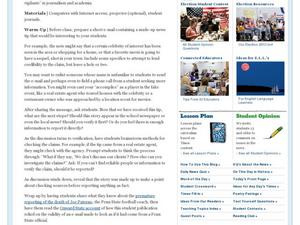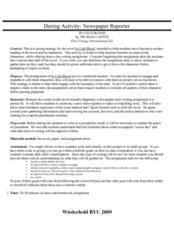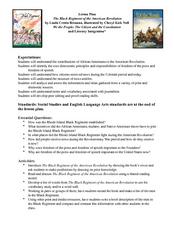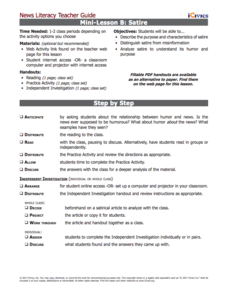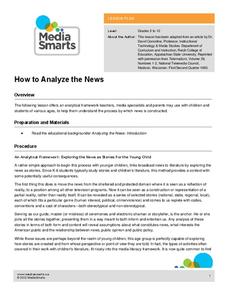Newseum
The Fundamentals of News
A short video introduces middle schoolers to different media-related news terms. Viewers then complete a worksheet and discuss the differences between news and journalism, between facts and opinions.
Curated OER
Nellie Bly's Newspaper Club: Introducing the Art of Writing
Students use video and the Internet to research the life of Nellie Bly, a famous female reporter from the 19th century. They research a writer and present their information to the class in the style of a news reporter.
Curated OER
Feature Story/Interview Lesson Plan
Young journalists get a chance to practice their story writing skills by listening to an interview. Using the provided script, a class member interviews a treasure hunter (the instructor) while classmates take notes and then compose a...
Curated OER
Check It Out: Verifying Information and Sources in News Coverage
If it’s in the news it must be true, right? Prompted by a New York Times article, class members consider the importance of accuracy in reporting and validating sources. The detailed plan includes warm-up exercises, discussion questions,...
Curated OER
In Cold Blood: A During Reading Activity
Following the method used by Truman Capote, class members research a major character from his novel, In Cold Blood, and then conduct an interview with that character. The resulting research is used to craft a newspaper article about the...
Curated OER
Nellie Bly's Newspaper Club: Introducing the Science of Writing
Students evaluate a video about Nellie Bly, a famous reporter from the 19th century. They consider what makes a high-interest news article, write an essay in pairs and present it a literary tea.
VH1
Lesson 4: Behind the Movie Chicago
The elements of music and journalistic integrity in one instructional activity; What could be better? The class discusses journalistic approaches to better understand responsible reporting versus sensationalism. They watch the Act One...
Curated OER
Macbeth News Broadcast
Here is an authentic assessment task for Shakespeare's Macbeth. Young literature scholars prepare, perform, and record a news broadcast about the major events in the play. For example, groups may choose to report on the death of Lady...
Curated OER
We the People: The Citizen and the Constitution: The American Revolution
The contributions of African-Americans to the American Revolution are the focus of this Social Studies and language arts activity. After reading and discussing Linda Crotta Brennan’s The Black Regiment of the American Revolution, class...
iCivics
Mini-Lesson B: Satire
Hey, what's so funny? Explore the use of satire in a variety of media with a hands-on lesson. Fourth in a five-part journalism series from iCivics, the activity introduces satirical language in print and online. Pupils work alone or in...
Media Smarts
Bias
See how bias operates firsthand. Half of the class reads one article while the other half reads another article on the same event. The obvious differences emerge when the two sides talk about their observations though. Several handouts...
Newseum
Use ‘War of the Worlds’ to Teach Media Literacy
Orson Welles' 1938 radio broadcast of "War of the Worlds" is the focus of a lesson that looks at the importance of clarity in broadcasting. After listening to the radio broadcast, class members discuss the ethical obligations to...
Curated OER
A Way with Words
How do facts and opinions impact the news? After reading "How to Cover a War" from the New York Times, middle schoolers evaluate the claims in the article. They also consider the media's responsibilities in reporting during wartime....
Curated OER
The Scoop Through Desktop Publication
Drafting, revising, and editing is all apart of the publishing process. Using a series of documents as inspiration, young journalists compose a class Newspaper. They work independently and in groups to publish their own articles.
Curated OER
I Hate to Complain but your Cheese Stinks
Students read and discuss the "fractured" fairy tale "The Stinky Cheese Man". They imagine that they are in the fairy tale and write a letter of complaint concerning the Cheese Man and how he stinks up the town.
Curated OER
The News Behind the Story
What a fun way to analyze plot, setting, and character. Learners review story elements, read a short fictional story, then turn the events of that story into a headlining news paper article. Not only does this lesson engage critical...
Curated OER
Writing a Newspaper-Style Article
Help your secondary reader/writers assess texts by studying press releases from Statistics Canada and drafting articles based on them. They then compare the press release, their own articles, and actual news stories they find online. I'd...
Curated OER
Lesson: Resolving Conflict Creatively
The wood sculpture Nkisi Nkondi is said to have been used to aid in conflict resolution. Learners pretend they are journalists reporting on a conflict in which the figure was used to resolve an issue. A creative and interesting use of...
Curated OER
Analyzing Two or More Nonfiction Texts
How does recognizing the author's purpose help you draw conclusions about a topic? Using two articles (both are attached), learners brainstorm why each author wrote each article. Are their purposes similar or different? Learners use a...
Curated OER
When Is a Noun a Verb? Examining Double Duty Words
The New York Times' Learning Network provides great lessons! This one uses articles from the paper to help readers understand homonyms like mail (verb and noun). It also includes an exercise in reading informational text. Links to the...
Curated OER
A News Story of Your Own: Sentence and Lexical Variety
Given the two-sentence skeleton of a news story about a car theft/joy ride, budding writers create their own version of the story varying diction and sentence structure to heighten interest and complexity in their writing. Resource...
Curated OER
Bias and Crime in Media
Critical thinking and social justice are central themes for this resource on bias and crime in media. The class views and discusses an incisive PSA that highlights assumptions based on race. Small groups read newspaper opinion pieces...
Media Smarts
How to Analyze the News
Teach kids how to watch television, specifically the news, with this creative idea for learners of all ages from the Media Awareness Network. The elementary school plan focuses on presenting news as a story and uses Jon Scieszka's story...
Media Smarts
Marketing to Teens: Gender Roles in Advertising
Young learners explore gender roles in advertising by taking an ad campaign they have seen which is specifically directed to one gender, and redesigning the campaign to target the opposite gender. After leading a guided discussion about...
Other popular searches
- Broadcast Journalism
- Yellow Journalism
- Journalism School Newspapers
- Journalism Layout
- Journalism Lesson Plans
- Photo Journalism
- Investigative Journalism
- Broadcast
- Journalism Introduction
- Journalism History
- Radio Broadcast
- Journalism and the Media





